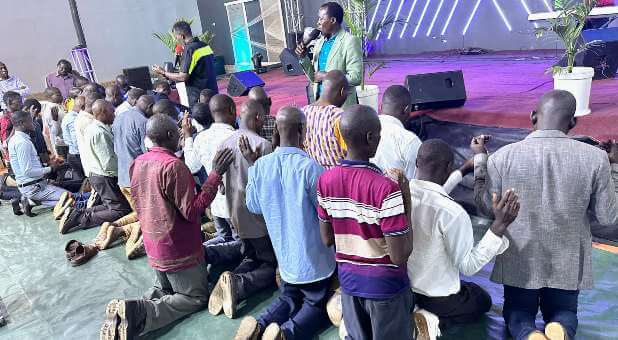Last week I was speaking at a men’s conference in western Uganda near the city of Rwentobo. After one afternoon session about marriage, men stood to repent of how they had physically or verbally abused their wives. Some of them later texted me to say they had confessed their sins to their wives.
The next day, in a session about sexual purity, the men gathered in small groups and repented of fornication, adultery and pornography addiction. Many men later phoned their wives to admit marital failure. Others told me it was the first time they had ever told anyone about their sexual failures.
All this open confession reminded me of one of the most significant revivals of the 20th century.
Ugandans call it Balokole. In the Luganda language it means “the saved ones,” but the word became synonymous with the East African Revival. It began in September 1929, just before America’s Great Depression.
Historians trace it to a prayer meeting on Namirembe Hill in Kampala, Uganda, where a missionary to Rwanda, Joe Church, prayed and read the Bible for two days with his friend Simeoni Nsibambi. They felt God had shown them that the African church was powerless because of a lack of personal holiness.
Breaking News. Spirit-Filled Stories. Subscribe to Charisma on YouTube now!
It is impossible to explain exactly what happened after this prayer meeting or how the resulting spiritual fervor spread. When God comes, unusual things happen. Within weeks after Church returned to Gahini, Rwanda, Christians gathered to pray and confess their sins openly.
A heavy spirit of conviction fell on the people. Whenever they repented for their sins and failures they would weep uncontrollably, ask others to forgive them and pledge to make restitution.
The weeping spread to farmlands and open fields. Unbelievers who visited these gatherings were converted after they witnessed the sincerity of the Christians.
Repentance went deep. Husbands publicly apologized for adultery, and farmers repented for stealing cows. Eventually, as the revival spread from Rwanda to Uganda, Kenya, Tanzania and Burundi, even the centuries-old tradition of polygamy (which was still common among professing Christians) was halted in some areas.
Balokole changed African Christianity forever. Michael Harper writes of the revival: “Its effects have been more lasting than almost any other revival in history, so that today there is hardly a single Protestant leader in East Africa who has not been touched by it in some way.”
Whenever I visit Uganda, I meet people who still talk about the East African Revival—more than 90 years after it began. It breathed Resurrection power into traditional churches and triggered aggressive church-planting movements that affected many denominations.
Whether sermons were delivered from pulpits, under trees or next to mud huts, African preachers who were affected by the revival taught about the blood of Jesus and the anointing of the Holy Spirit. Leaders also stressed the message of 1 John 1:6-7 (NASB 1995): “If we say that we have fellowship with Him and yet walk in the darkness, we lie and do not practice the truth; but if we walk in the Light as He Himself is in the Light, we have fellowship with one another, and the blood of Jesus His Son cleanses us from all sin.”
As in other spiritual awakenings in history (such as the Asbury Revival in Kentucky in 1970), people stood in front of each other and admitted their sins, no matter how embarrassing. The brutal honesty cut deep into human pride and dealt a fatal blow to religious hypocrisy.
I’m convinced this type of movement is the only thing that will pull the United States out of its current despair. We need a spiritual awakening; political change alone can’t save us. Our only hope is that a backslidden American church—a church that is as smug, blind and lukewarm as the Laodiceans—will “be zealous and repent,” (Rev. 3:19b).
What encourages me is that God, not man, initiated all the spiritual awakenings of the past, including the First Great Awakening, which gave our country its historic Christian identity; the Azusa Revival, which spread Pentecostalism globally; and the East African Revival, which made Christianity the dominant faith in a huge swath of Africa.
As we conclude Black History month, it’s important to remember that many humble African Christians made a huge impact on the progress of the gospel when they carried the fires of revival throughout the heart of Africa. Do it again, Lord!{eoa}
Join Charisma Magazine Online to follow everything the Holy Spirit is doing around the world!
J. Lee Grady is an author, award-winning journalist and ordained minister. He served as a news writer and magazine editor for many years before launching into full-time ministry.
Lee is the author of six books, including 10 Lies the Church Tells Women, 10 Lies Men Believe and Fearless Daughters of the Bible. His years at Charisma magazine also gave him a unique perspective of the Spirit-filled church and led him to write The Holy Spirit Is Not for Sale and Set My Heart on Fire, which is a Bible study on the work of the Holy Spirit.








Leave a Comment
You must be logged in to post a comment.